
~ Sneak Peeks ~
Untold tales, visits behind the scenes, and snippets that plunge you into Sting Ray Summer.
Ann in '63: The-girl-next-door kind of friend
Loss of my “Ole Buddy”– A Good Thing
Terry, Sting Ray Summer, Ch01: Hungry Lions, Circling, June 4, 1964, Boulder, Colorado:
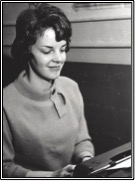
Ann Garretson, 1963
“Through our college years, Annie had been my best friend. The-girl-next-door kind of friend. The friend I could meet for coffee on the spur of the moment – no shower, shave, or ironed shirt needed. The everyday friend who swapped tales from the books we’d read and news we’d heard. The friend who consoled me when my father was killed. The first person I called when the Peace Corps invited me to go to Venezuela.
“Those were the early years, 1960-1963, our ‘ole buddy’ years, before the 1964 March winds blew the cobwebs out of my brain and I realized Ann was a girl – a captivating one.”
Turns out she’s better than the girl next door!
Terry in '63: A Kindred Spirit
Sharing our Secret Hopes and Dreams . . .
Ann, Sting Ray Summer, Ch01: Hungry Lions, Circling, June 4, 1964, Boulder, Colorado:
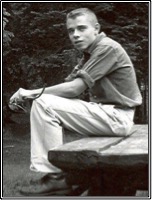
Terry Marshall, 1960
“We entertained each other with shiny nuggets from our professors, and relished the conceit of debating topics we’d never heard of in our rural high schools. We shared spirited chatter over burgers at McDonald’s on Sunday nights when the dorm cafeterias were closed. We met for coffee at the student union. We went on bike rides and picnics; to plays, lectures, and concerts together.
“We didn’t date; we simply did things together, usually on a whim. We didn’t have to dress up or worry about trying to impress each other. Best of all, I didn’t have be on guard with him; too many guys were only after sex. Terry and I were buddies, platonic to the core. He was the friend I could call any time, simply to talk. And talk we did.
“He obsessed on the Peace Corps, ached to live overseas, and pressed me for every detail of my freshman year of high school, the year Dad was Port Commander in Livorno, Italy. We spun out our secret hopes and dreams. He wanted to own a small town newspaper. He’d become a modern-day Lincoln Steffens or Upton Sinclair, expose corruption, dig out injustice, write editorials to spotlight racism and poverty.”
Jack in '63: The Lieutenant with his Wheels
Our Romance Blossomed like a Century Plant
Ann, Sting Ray Summer, Ch01: Hungry Lions, Circling, November 1963, Boulder Colorado:
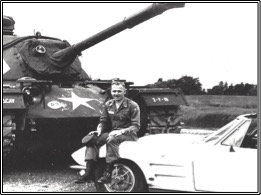
Jack in ’63: The Lieutenant with his Wheels
“Jack transcended my highest hopes. In the top five percent of his West Point class, he was an Airborne and Ranger schools graduate, one of the first in his class promoted to troop commander, an invitation in hand to teach math or tactics at West Point, his choice. Charming. Considerate. Witty.”
No Male Chauvinist Pig
“Better yet, our letters revealed he would be a stalwart supporter of my own career goals and would see me as an equal partner in achieving his. He was no ‘male chauvinist pig’ – the ultimate epithet for men too blind to recognize women’s talents. A bonus: we had the same values about love (precedes sex) and marriage (a life-long commitment). I could flourish with Jack. I knew Army life – as the daughter of a career officer, I was an Army brat.
“Our correspondence blossomed like a century plant, as if the seeds had been gestating all along. Jack began to sign off with Love, then All my love. His letters and audiotapes became steeped in unabashed love. How could I resist such declarations as these?”
Archaeologists at Work: Uncovering the Military Hangout
Army Officers’ Club Morphs to Music School
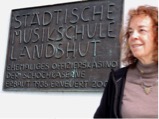
Ann at former military hangout — where weapons have been replaced by flutes, and clarinets, and …
Ann, Sting Ray Summer, Epilogue Dare We Relive History? May 5, 2014, Landshut, Germany
“We find the former American Army Officers’ Club. No Military Police on duty, rifles at the ready. A brass plaque identifies the building as Stadtische Musikschule Landshut, the Landshut Music School. Below that, another brass plaque verifies that it was indeed the Officers’ Club.” In a word, we’ve found the military hangout!
“The front door is unlocked. We creep in. No receptionist. No soldiers in dress greens.
“From far down the hall, a single flute plays – not a German Jean-Pierre Rampal, assuredly, but not a rank beginner; a simple melody, not one we recognize.
“This isn’t the free-flowing club I remember. The interior has been sliced and partitioned; rows of doors lead, apparently, to tiny practice rooms, all locked.”
The Military Hangout Is Gone. What Am I Looking for?
“A whiff of reminiscence, perhaps? The thrill of a recaptured memory that I can wrap in a tissue paper of words and safely stow for the future? Or is this an inquiry into the fragility of human institutions? Where now are those hale warriors who guarded the borders of human freedom? Long since gone . . . every one.
“We enter a glass-walled great room through an open door and discover a small stage fronting rows of neatly arranged folding chairs on a burnished parquet floor. ‘This was the dance floor. We danced here, my brother and I, and –’
“Terry is looking at me quizzically. ‘Yeah, I bet you did. Just you and your brother, huh?’
“‘Well, Jack too, of course.’” Delicious memories from this military hangout paint themselves on my mental palette.
“Fifty years later, I no longer have to speed from one conversational safe house to another, trying to skirt memories too painful for Terry to hear.”
Detectives at Work: Navigating the Crystal Road
Could a Crystal Vase Have a Long-Lost Cousin?
Terry, Sting Ray Summer, Epilogue Dare We Relive History? May 7, 2014, Frauenau, Germany:
“Through a downpour, we navigate the ‘Crystal Road,’ a two-lane highway that shadows the Czech Republic border from the south at Passau to Neustadt an der Waldnaab in the north. This was the heart of Bavaria’s hand-blown glass industry. We’ve cruised small towns, scoured crystal shops, showed them our eight-by-ten photos of the blue vase Jack had bestowed on Annie in 1964 – and the matching bowls he gave us as our wedding present. ‘Where did these pieces come from? Who made them?’ we’ve asked. No one knows.
“At WaldKristall guesthouse, we show the owner, Michael Kaphammer, our photos. He’s fluent in English; he’s been to Las Vegas, the city we’ve called home for fourteen years. ‘Leave the photos with me. I’ll ask my father,’ he says.”
Invitation into a Crystal Road Secret Vault
“The next morning, Michael greets us, ‘My father asks if you would like to look at his work.’ We dash a half-block in the rain to Michael’s personal residence. He leads us to the basement, into a sixty-foot-long rectangular storeroom, shelves four high on every windowless wall, every shelf filled with gleaming crystal – a bedazzling array of vases, bowls, stemware, decanters, flaçons, tumblers, goblets in a rainbow of colors, all hand-blown and cut by master artisan Siegfried Kaphammer, Michael’s father.
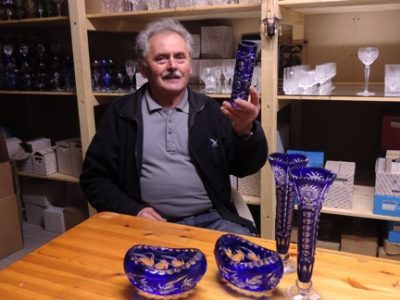
Siegfried Kapfhammer: Could he be the master artist we’ve searched for?
“Siegfried sweeps his hand around the room, gestures at the full shelves. ‘This is my life’s work,’ Michael translates. ‘You are welcome to look.’
“The shelves hold few blue pieces, but Annie spots a pair of slender Palatinate-blue vases, with vertical rows of the same transparent silvery ovals as Jack’s vase, topped by filigree designs in the flared rim, delicate as spider webs. ‘Will he sell these?’ she asks.
“‘Ja,’ Siegfried says, nodding. ‘Ja!’”
“We select a matched pair of banana-boat bowls, replete with silvery ovals and swirls, heavy as . . . well, heavy as lead crystal. And a tall, cylindrical vase, artful as a totem pole . . .
Welcome to the Select German Crystal Road Fan Club, Terry!
“Outside in the car, Annie and I realize that our quest is over. Siegfried is a surrogate connecting us to a time and place that no longer exists. He has given us an indelible memory of how much his art – so much of it now languishing in a dark basement – means to an artist of his talent. Moreover, he has drawn me into that intimate circle that links Jack to Annie and her summer of ’64. That summer is now my summer, as well as theirs.”
And our journey along the Crystal Road has yielded more than I ever expected.
A Mountain Wedding: Perfect!
Parental Hurdles Spark Creativity
Terry, Sting Ray Summer,: Ch 21, Decision Reversed, December 2, 1964, Glendale, Arizona:
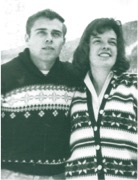
Terry and Ann, Silverton, March 12, 1964
No question: Annie’s parents were opposed to our getting married. Here’s how we wound up with a mountain wedding:
“They’re hoping that if we postpone it, I’ll come to my senses and call it off,” she said. “But I’m stymied, Ter. No church. No minister. What now? Checkmate?”
“Maybe not.” I pulled out Allen Nossaman’s letter. “Listen to this: ‘Why in the hell don’t you two get married in Silverton? Jim Price says he’d be happy to officiate.”’
A Mountain Wedding? Of course!
“We stared at each other, eyes wide, as if we’d witnessed a miracle. To Annie’s folks, our plan to get married in the desert – in the shadow of a Saguaro rather than a cross – was akin to blasphemy. Her mom had told her, “Annie, you simply have to have it in a church. It’s not a camp-out. It’s a wedding. It’s holy matrimony – a marriage before God.”
“Not only was Jim Price one of our Silverton gang, he was an ordained minister, with a church. And it would be in the town we loved. ‘Why not?’ I said. “Why the hell not?’
“Annie nodded. ‘Let’s do it.'”
Rodeo Holiday – Perfect Day for a Wedding!
“Back at Annie’s apartment, we studied her school calendar as if it were a newly discovered Dead Sea Scroll. Rodeo Holiday, March 11-14, was the only break between Christmas and the end of the school year. That was it.
“I fired off a letter to Allen. ‘You’re on. We’ve postponed the wedding. We’ll do it in Silverton, probably the weekend of March 11-14.’”
And that’s how we wound up with a mountain wedding on a snowy weekend in March.
Birthday Gift Tales
Rivals Duel by Long Distance
Ann – from Sting Ray Summer, Ch01: Hungry Lions, Circling, Boulder, Colorado, 1964:
This birthday gift tale still has me tied in knots: “As my April 19 birthday neared, Terry let slip he’d gotten me Turnbull’s The Letters of F. Scott Fitzgerald, a must-read. Plus he’d made reservations in Denver on Sunday – my birthday – for dinner and Becket, the hot new Richard Burton-Peter O’Toole movie. He asked me to ‘dress up a bit.’ Dress up? Us? ‘My goodness, is this a date? A real date?’ I asked. “‘I got a corsage,’ he whispered, as if he feared I’d discover he was a romantic after all.
Not to be outdone . . .
“Late Thursday afternoon, April 16, I trudged into the dorm after a long stint in the library. A symphony of fragrances perfumed the lobby. Julie rushed up: “‘My God, Ann, what have you done? Promise that German guy the first three days in bed?’” “What now? Julie’s mouth could be as smutty as her weekend trysts. ‘Maybe later, huh?’” “She marched me to the reception desk. ‘Look at these flowers. It’s the flashiest let’s-get-it-on offer I’ve ever seen. I’d go down with a guy for a week if he sent me that.’ She pointed to a huge bouquet of spring flowers in a vase as stunning as a museum piece. The envelope read, To my dearest Ann. From Jack.Wow, theywere for me. No, not possible. Not from Germany. “‘So open the card,’ Julie said. ‘How’d he send those from Europe anyway?’
I hit Julie with the Stink-Eye
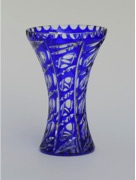
With an internal glow of pure gemstone, the vase captured the moment, and so much more.
“This had to be a joke: a gang of girls in the dorm. I hit Julie with the stink eye, but she didn’t notice; she was ripping open the envelope. I snatched it away, pulled out the card. I started to read aloud, but my voice choked off. ‘I’ve got to go’ I closeted myself in my room. I had that card memorized by dinnertime. I’m not a crier, but tears fell.
- My dearest Ann: The vase in which these flowers arrived (unless the florist in Boulder double-crossed me) is the only one of its kind in the world. I had it designed, hand-blown and hand-cut especially for you by a master German artisan. I hope you like it . . . because I also had him create two matching bowls, which should not be separated from the vase. So should I not be successful in my quest, you already know what your wedding present will be. – All my love, Jack
“The vase was sapphire blue, with an internal glow of pure gemstone, gleaming crystal intercut with diaphanous teardrop, oval, and serpentine curves.” My girlfriends looked on with envy – wow, TWO guys! For me, this birthday gift tale was excruciating. Each guy had a big hook embedded in my heart, and they were pulling in opposite directions.
Black Bear Pass: Traveling on the Edge
“You don’t have to be crazy to drive this road – but . . .”
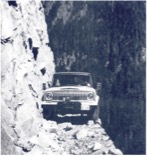
Black Bear Pass, Colorado
Terry, Sting Ray Summer, Ch07: Bumps on the Way to Saint-Tropez, July 4, 1964, en route from Silverton to Telluride, Colorado:
“A hand-carved wooden sign at the beginning of Black Bear Pass warned, Telluride, City of Gold, 12 miles, 2 hours. It added, You don’t have to be crazy to drive this road – but it helps. Jeeps Only.’
“We had something better: a Scout 80. We snapped photos of each other mugging the sign, declared ourselves crazy, and took off.
“The jeep trail disappeared over a cliff. Telluride may have been two miles away, but all I could see was a panorama of blue sky, and a tiny splotch thousands of feet straight down in the valley below. And no visible way to get there.”
Black Bear Pass: No railing and a 1,200 foot drop to Kingdom Come
“Allen anchored the fold-down windshield to the hood. ‘Better spot me,’ he said.
“We piled out before he’d finished the sentence. The trail angled onto a ledge gouged into the cliff wall, a rough, rock-strewn track with no railing and a 1,200 foot drop to Kingdom Come. Roger and Ann-Marie walked in front. Allen crawled forward. Janet and I trailed. We told ourselves we were guiding Allen down. Frankly, we were too scared to ride. We’d heard about jeeps that had plunged over the edge, no survivors.
“And now, Allen couldn’t possibly back up. We had to conquer whatever lay ahead.”
Suffice to say, Black Bear pass left me with a “bear” of a memory!
Terry's Dad: A Life Cut Short
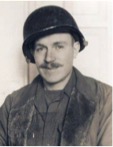
Charles Marshall, Germany, 1944
No politics over mashed potatoes at dinner
Terry, Sting Ray Summer, Ch 12: High Stakes Gambling, Center, Colorado
“After my father returned from the front lines of World War II, he threw himself into building the Marshall Produce Company, begun by his father in the late ’30s. Dad bought potatoes in bulk from farmers, then bagged and shipped them to wholesalers who stocked grocery stores throughout the West.
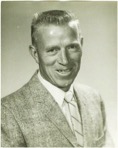
Charles Marshall, Center, Colorado 1960
“Mom was a housewife raising four kids. We didn’t talk politics at dinner. Or debate issues of the day. Or sit around reading great literature.”
We were the Anderson family, nurturing carbon copies
“No child or spousal abuse in our home. No alcoholism. No drugs. Dad and Mom were respected and active in the community: Veterans of Foreign Wars, American Legion, Masons and Eastern Star, the Methodist church. In summer we camped out and fished for trout. “We were the Anderson family in Father Knows Best: parents nurturing carbon copies of themselves.”
Until that day in April 1961. April 10, to be exact. Dad and Mom were driving home from a Masonic conference in Pueblo. They got stuck behind a lumbering farm truck on the two-lane road near Monte Vista. Suddenly the truck veered off the road. In the next split second an oncoming car with a drunk at the wheel hit my folks head-on.
In those days – before seatbelts – Dad went through the windshield. Broke his neck. He died instantly. Mom broke both legs, along with several ribs. She spent months in the hospital and in physical therapy, eventually returning to Center to raise my younger brothers and sister.
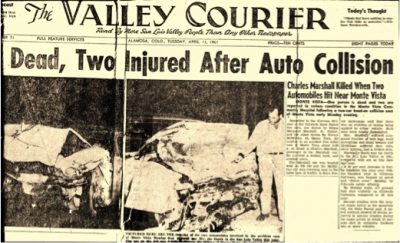
Charles H. Marshall, 1918 – April 10, 1961
Terry, his Mom, and the Chorus Girls
Out Strutted ‘Girls’ in Spangle-Covered, Skin Tight . . .
Terry, Sting Ray Summer, Ch 12: High Stakes Gambling, July 23, 1964, Harrah’s Casino, Reno, Nevada:
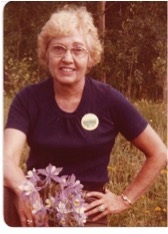
Margaret Marshall: Thoroughly modern Mom
“Mom and I scrunched up to one of the tiny cabaret tables, ordered Black Russians – ‘Wow, Terry, these are yummy!’ – and settled in, front row. There I was, rubbing knees with my mother, close as a hot date. The lights dimmed. Chatter died out. The orchestra roared to life.
“Out strutted the ‘girls’ in high heels and skimpy spangle-covered, skin tight, low-slung half-bikinis. And naked from head to hips! Bare naked – not even sporting those tiny tasseled pasties I’d seen on Bourbon Street when a carload of us drove from CU to New Orleans one spring break. That steamy tease nearly set me off, especially the girl who swung her tassels like tether balls simultaneously in opposite directions. But this troupe bested New Orleans.”
I was afraid Mom would box my ears
“The stage sparkled with topless beauties, bare breasts bouncing, nipples front and center. These girls danced. And pranced.
“I was afraid to twitch for fear Mom would catch me letching, then box my ears. I sat transfixed, blown away not only by the sex on display, but by the dancers’ enthusiasm, their energy, their athleticism. They were in better shape than I’d been when I wrestled in high school.
“Afterwards, as we filed out into the street, I couldn’t say a word to Mom, or look at her.
“‘Well,’ she said, once we had broken free of the crowd, ‘That was quite entertaining. Those girls are beautiful, aren’t they? So graceful. Too bad we have to leave tomorrow.’”
A Chance Meeting -- By Mail
His pick-up line: “I see you won the same contest . . .”
Ann, from Sting Ray Summer, Ch 1: Hungry Lions, Circling, October 1959, Alamosa, Colorado
Have you ever thought about how little things can provide hints to the course of your life: a chance meeting by mail, or in the street; a conversation overheard in a café; a missed plane connection; a letter out of the blue? Here’s one that I first ignored, but shouldn’t have:
“’Dear Miss Garretson.’ That’s how Terry started his first letter to me.” As I recount in Sting Ray Summer, “He’d written to me my senior year after my essay, ‘Why I Want to be a Newspaperman (woman)’ won me a trip to Detroit to represent Colorado at the Ford Teenage Press Conference for the unveiling of their hot new model: the Falcon.” A chance meeting? Really?
“Our high schools were just 30 miles apart in southern Colorado’s isolated San Luis Valley, and he’d won the contest the previous year. He wrote to encourage me to enroll in the University of Colorado, which had a first-rate journalism program. Confession: I didn’t answer his letter – I had hopes of attending a private college.
“Besides, I had heard Terry was ‘conceited'”.
A chance meeting leads to my new best friend
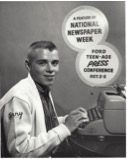
Terry at Ford Teenage Press Conference, 1958
Then, whaddyaknow? I wound up at CU in the fall of 1960 . . . met Terry my first week at the school newspaper, the Colorado Daily . . . we became best friends for four years. And the rest? It’s now memoir, provisionally titled Sting Ray Summer. Wow. I never imagined I would wind up married to the author of that random letter! (I still have the letter, by the way.) But was it a chance meeting — or an omen?
Fond Memories of Old Cars
The Ford Falcon vs. the Corvette Sting Ray
Ann, Sting Ray Summer, from various chapters, Boulder, Colorado,1960-64; Europe, Summer of 1964
Do you have any fond memories of old cars? Have you noticed how an old car can trigger memories, good and bad?
Take Terry’s 1960 Ford Falcon. 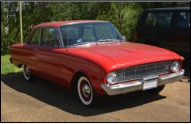 A collage of memories cruises past: On a whim, one Saturday in 1963, Terry and I load up his Falcon after he cajoles me into a crisp fall camping trip by a beaver dam on the James Creek above Boulder. The wind in the pines whispers in my ears, while the juice of a campfire-grilled hamburger dribbles down my chin.
A collage of memories cruises past: On a whim, one Saturday in 1963, Terry and I load up his Falcon after he cajoles me into a crisp fall camping trip by a beaver dam on the James Creek above Boulder. The wind in the pines whispers in my ears, while the juice of a campfire-grilled hamburger dribbles down my chin.
Now it’s Sunday, and we’re pilling into the Falcon for a ritual trip to McDonald’s for 15-cent hamburgers and 10-cent fries, when the dorm cafeterias are closed. The burger is a pale imitation of the James Creek fare, but oh, our conversations about politics, our classes, and our aspirations more than compensate.
But Wait – A Fond Memory of Another Old Car Zips into View
It’s the summer of 1964. Oh, my. I’m buzzing around Germany – by myself – as I learn to drive my West Point boyfriend’s racy 1963 Corvette. 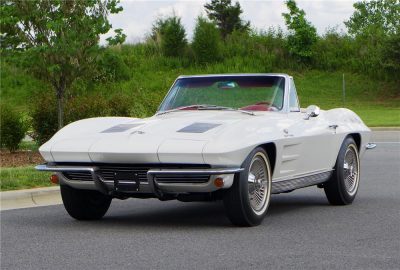 Then, two weeks later, my boyfriend Jack and I are careening through Europe together, camping in pastoral Germany, soaking up history in Paris, sunning ourselves at Saint-Tropez, exploring the Italian countryside.
Then, two weeks later, my boyfriend Jack and I are careening through Europe together, camping in pastoral Germany, soaking up history in Paris, sunning ourselves at Saint-Tropez, exploring the Italian countryside.
The Sting Ray turns heads and engenders comments all the way. Memories so unforgettable I’ve captured them all in STING RAY SUMMER, even that shame-engendering night I backed the Sting Ray into a ditch. NOT something I would recommend.
Some fond memories of old cars are NOT all that “fond”!
My Home Town: No Radicals. No Protests.
Main Street in Small Town America
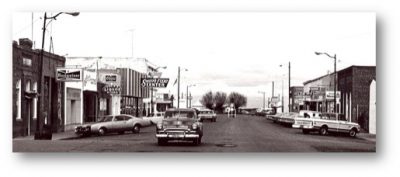
Center, Colorado: A one stoplight town
Terry, Sting Ray Summer, Ch 12: High-Stakes Gambling, Center, Colorado
“I spent my formative years on a farm near an isolated small town. Center had a two-block business district and a single traffic signal. For entertainment we had a pool hall on Main Street and a drive-in movie three miles out of town. No radicals there. No socialists. No protests.
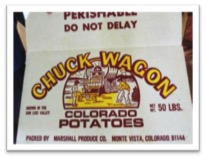
Dad knew potatoes
“My father had been busy building the Marshall Produce Company, begun by his father in the late ’30s. Dad bought potatoes in bulk from farmers, then bagged and shipped them to wholesalers who stocked grocery stores throughout the West. Mom was a housewife raising four kids. We didn’t talk politics at dinner. Or debate issues of the day. Or sit around reading great literature.
“No child or spousal abuse in our home. No alcoholism. No drugs. Dad and Mom were respected and active in the community: Veterans of Foreign Wars, American Legion, Masons and Eastern Star, the Methodist church. In summer we camped out and fished for trout.
“We were the Anderson family in Father Knows Best: parents nurturing carbon copies of themselves.”
Home, Home on the Ranch . . .
Ann’s Place: Wide Open Spaces
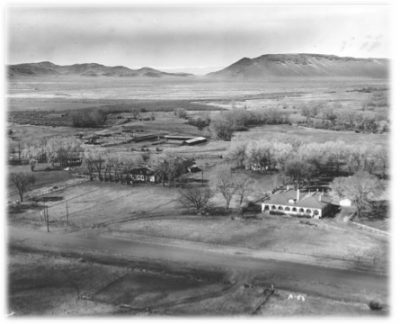
The Cross Arrow Ranch, southern Colorado
Ann, Sting Ray Summer, Ch 2: Castles in the Air, June 12, 1964: Ann and Jack touring Southern Bavaria, Germany:
My life at the Cross Arrow Ranch was a far cry from rural Germany. The two were as different as brown and green, yet both leaving their indelible impressions.
“Jack launched into an animated treatise on Bavarian farming as we whizzed through the crazy-quilt of farm plots in shades of forest and olive green, sepia, tan, and ecru. ‘They’re mostly small family farms,’ he said. ‘They sell their fresh meat and produce locally. Germans don’t waste a square inch of land.’
“Truly a world apart from the American West, where we lose so much land to desert and mountains. Our ranch in Colorado’s arid San Luis Valley sprawled over two thousand acres, speckled with tumbleweeds, rabbit brush, and Russian thistle, and etched with a network of growing arroyos, land so harsh our spread could support only two hundred head of cattle.”
MLK and Me on Red Mountain Pass
MLK Called to Me on the Mountaintop!
Terry, Sting Ray Summer, Ch 4, “Alone”, August 28, 1963, Red Mountain Pass:
“I was driving over cliff-hugging, two-lane Red Mountain Pass between Ouray and Silverton, Colorado when a cloudburst forced me off the highway. I turned on the radio. Through the static, I could hear Martin Luther King Jr., all the way from the March on Washington to the top of Red Mountain Pass.”
I Felt Like He Was Talking to Me – on Red Mountain Pass
“I had never heard him speak. He poured similes over metaphors and wrapped them in allegories. He knew when to pause, when to repeat, when to shout, when to whisper. He boomed, ‘Let freedom ring from the mighty mountains of New York . . . from the snow-capped Rockies of Colorado.’ He called to me – directly to me, here on Red Mountain Pass in the snow-capped San Juan Mountains.”
Where were you in 1963 when MLK inspired the nation with his dream?
Memorable Pup Tent Experience
Ann Camps Out; Terry Squirms
Terry, Sting Ray Summer, Ch 4, Le Grand Tour, June 30, 1964:
After 50 years of marriage, you’d think we wouldn’t have a lot of hidden memories, or that I would have to compete with some “memorable pup tent experience”. Ha! Wrong!
OK, so Annie and I pledged to explore our past fully and honestly when we set about to write our joint memoir. But early into the book — chapter four – Annie is detailing her first month in Europe visiting her West Point lieutenant. They’re on their way from his post in Landshut, Germany to Paris in his 1963 Corvette Sting Ray.
First night out, they stop near Strasbourg, France. He hauls out his Army pup tent. Sets it up.
What, they’re going to spend the night in that tiny tent? Together? Oh, sure, she’s got her misgivings, but me? Whoa! She calls this a “memorable pup tent experience”! This story, Sting Ray Summer, may be more than I bargained for!
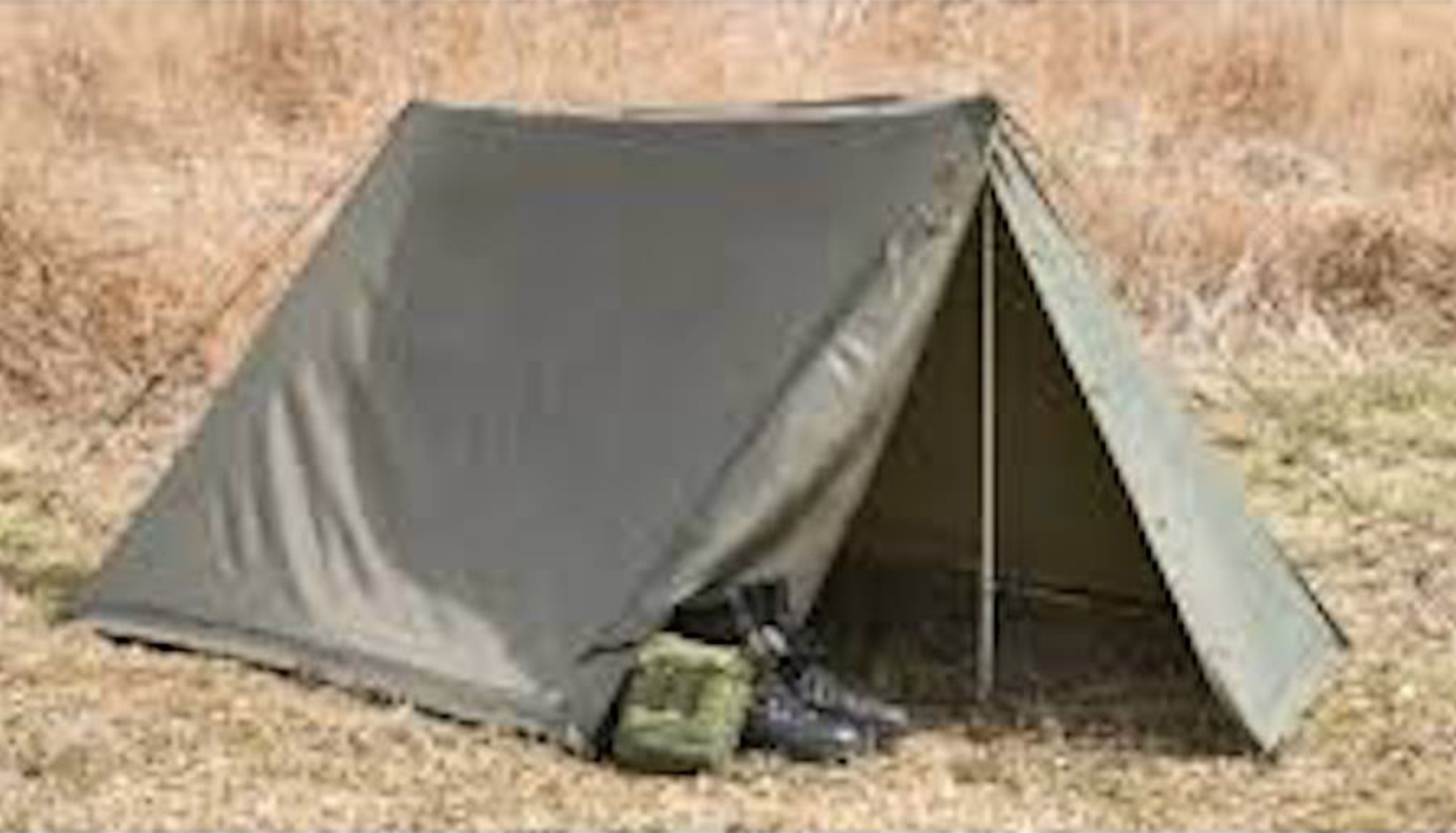
The Joy of Christmas
Music Triggers Bittersweet Memories
Terry, Sting Ray Summer, Ch 4: Alone, September 1963, 1964, Salt Lake City, Utah
Just recently, I came across an old vinyl album, “The Joy of Christmas,” in the back of our closet: Leonard Bernstein conducting the New York Philharmonic with the Mormon Tabernacle Choir.
The album sends me back to September 1963: I was camping out near Salt Lake City, trying to figure out why I’d just lost another girlfriend. I wandered into the Mormon Tabernacle and happened upon the recording session for this album — “Joy to the World.” I’m not LDS, but listening to those two groups live is something you don’t forget.
This, too, this “Joy of Christmas” is important music from my Sixties.
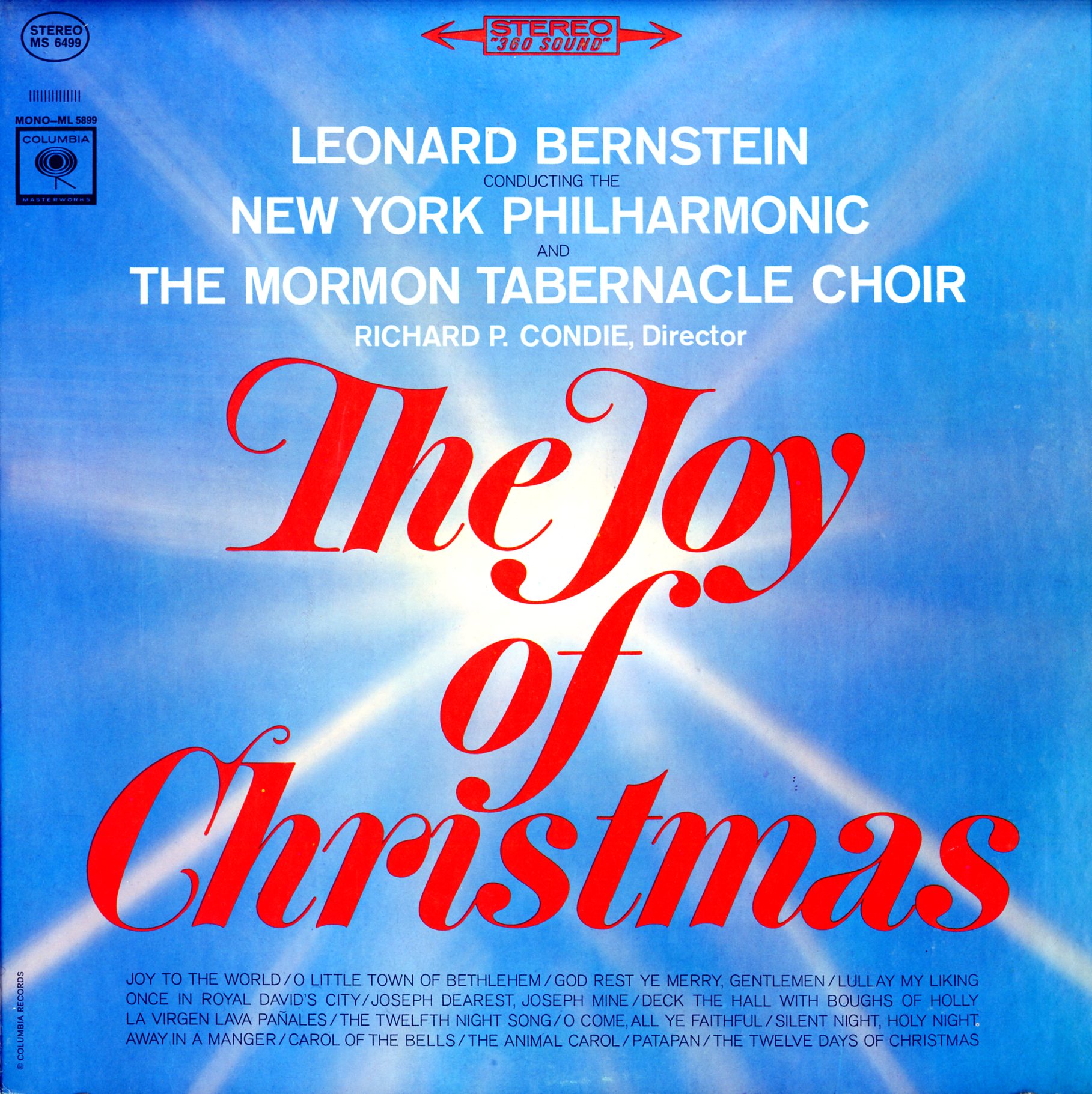
Salacious Proposal
Old Letters Spark Shocking Memory
Terry, Sting Ray Summer, Ch 4: Alone, September 1963, Main Street (Greene) in Silverton, Colorado
I’m editing the section on my wild summer as a young journalist in Silverton, 1963, and I cringe – again – at a salacious proposal.
I’ve dug out my old letters. Many fond memories tucked inside, sure. But I can’t believe I asked Laura Lee to call off her wedding (six weeks away) and move in with me.
What was I thinking?
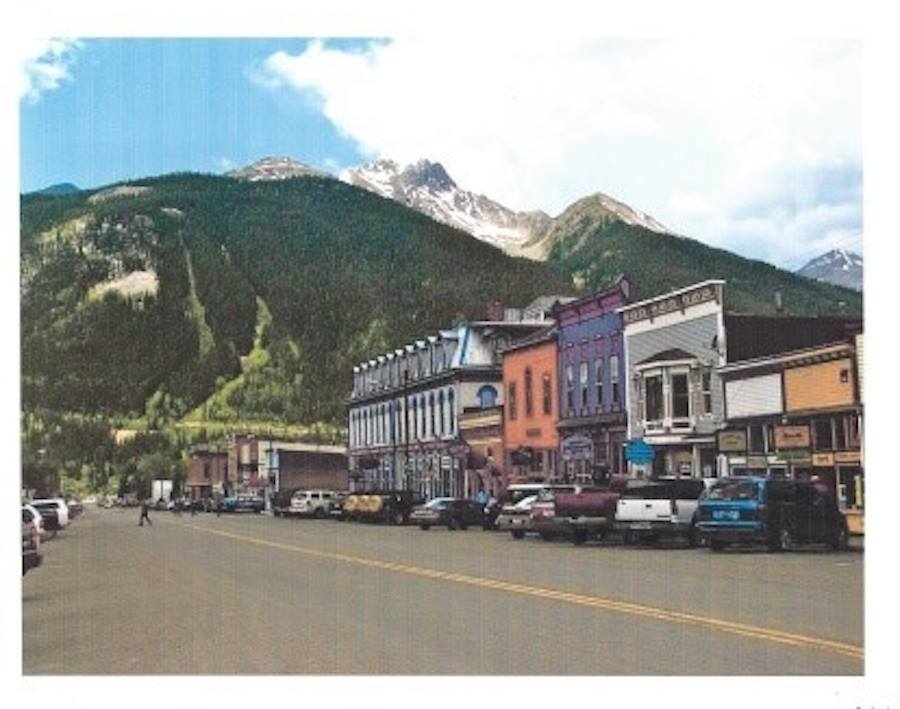
From Hanoi Hilton to Washington
An Uneasy Peace at the Peace Corps

Powerful book and documentary evoke powerful memories
Terry, Sting Ray Summer, Ch 14: A Dream Crashes and Burns, August 1964, Center, Colorado; June 1981, Washington D.C.; and 2009, Hanoi, Vietnam
The Hanoi Hilton leaps from the pages of chapter 3 in Geoffrey Ward’s The Vietnam War, based on the Ken Burns-Lynn Novick PBS series. I come to this date: August 4, 1964. Aeii, the memories!
That day, the U.S. began bombing North Vietnam. And that day, the North Vietnamese shot down their first American jet fighter. The pilot: Lt. Everett Alvarez, 26, from Salinas, California. Everett would spend the next 8½ years in prison, much of it in the infamous Hanoi Hilton. He’s America’s longest-held prisoner of war in Vietnam.
Also on that day, August 4, 1964, I was at home in Center, Colorado, two months out of college, ten days from entering the Peace Corps, and hoping Ann Garretson would accept my marriage proposal – sent to her airmail while she was traveling Europe with her West Point lieutenant in his 1963 Corvette Sting Ray. Weeks had passed since I had proposed.
She hadn’t answered. I couldn’t stand it. I sent my plane ticket back to the Peace Corps . . . and waited for her answer. It came a month later: “No.” (Both Peace Corps and marriage worked out later, but those are different stories.)
Fast Forward to June 1981: The Long Shadow of the Hanoi Hilton
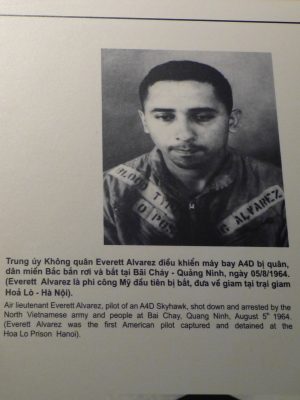
Lt. Everett Alvarez, as POW
Everett Alvarez takes over as Deputy Director of the Peace Corps in Washington, D.C. Suddenly, he’s my supervisor’s boss.
Alvarez and I have nothing in common – he’s military to the core, a dyed-in-the-wool conservative, and he doesn’t know squat about the Peace Corps. On the day he joins the staff, I have six years of experience with the Peace Corps, including two years as a volunteer in the Philippines, three years as the country director in three South Pacific nations, and a year on the Washington staff. I’m one of those people Alvarez spurns as “ex-volunteers who had signed on for permanent jobs at headquarters when their field tours were done.”
All of us – he will write in his first book, Chained Eagle – are a bunch of young idealists, anti-war activists, and irresponsible spenders, as well as “something less than skilled managers.” It’s clear that he doesn’t trust us. Nor we, him. In fact, we on the Washington staff are anything but of one mind – in our politics, training, and experience.
Nor are we slackers: Many of us log numerous ten- and twelve-hour days, and plenty a weekend. By contrast, Alvarez accepts his full-time Presidential appointment as deputy director, then enrolls in law school, and spends less than full time with the Peace Corps. My office is down the hall from his, but Alvarez is a loner. He doesn’t mingle. We do our jobs; he doesn’t interfere. We scarcely hear him say a word, no more than a mumbled “morning” when we pass in the hall.
Invisible POW Ghosts Hover
One afternoon, not long after he moved into his office, I find myself alone with him in the john. He stands slumped forward, his eyes glazed over. A deep, sad sigh arises from what seems like the depth of his soul.
Thirty Years Later, a POW Uniform Triggers New Understanding
In 2009, nearly 30 years later, I come across Everett’s prison uniform on display in the Hanoi Hilton in Vietnam. I finally get a glimpse of the brutality he experienced, and begin to understand the meaning of that long, heart-wrenching sigh. The Vietnam War – both book and the PBS series – bring those memories flooding back.
"Vietnam War" Stirs Unforgettable Memories
My 53-year-old Conundrum Is Anchored in the Vietnam War
Ann, A Rendezvous to Rememberr, Ch 21: Landmines on the Road to Silverton, Fall 1964-Spring 1965, Glendale, AZ
Do unforgettable memories fade or do they become more indelible over time? After Ken Burns and Lynn Novick etched The Vietnam War more deeply into my psyche, I know the answer: They are inescapable. I grew up an Army brat and embraced the patriotism, the devotion to duty, the self-reliance that came with military life. But deep inside, I was a peacenik – beginning in first grade – before we ever had the word.
The Question: Embrace Tradition or Marry a Peacenik?
The Vietnam War documentary series yanked me back to that national conflict: to the Gulf of Tonkin resolution, to protests in American cities, to body counts across the Pacific, and to changing positions by our leaders. More personally, it plunged me into that 53-year-old dilemma of whether I should marry my peacenik best friend or my West Point officer boyfriend. One would go to jail rather than fight in a war we both thought was wrong. The other would risk his life to fight in that same war. Either way was fraught with personal anguish for me. That anguish, which Terry and I have written about, has flooded my memories, thanks to Ken Burns’ The Vietnam War.
The Vietnam War Defines an Epoch
What are your memories—or impressions—of the Vietnam War?
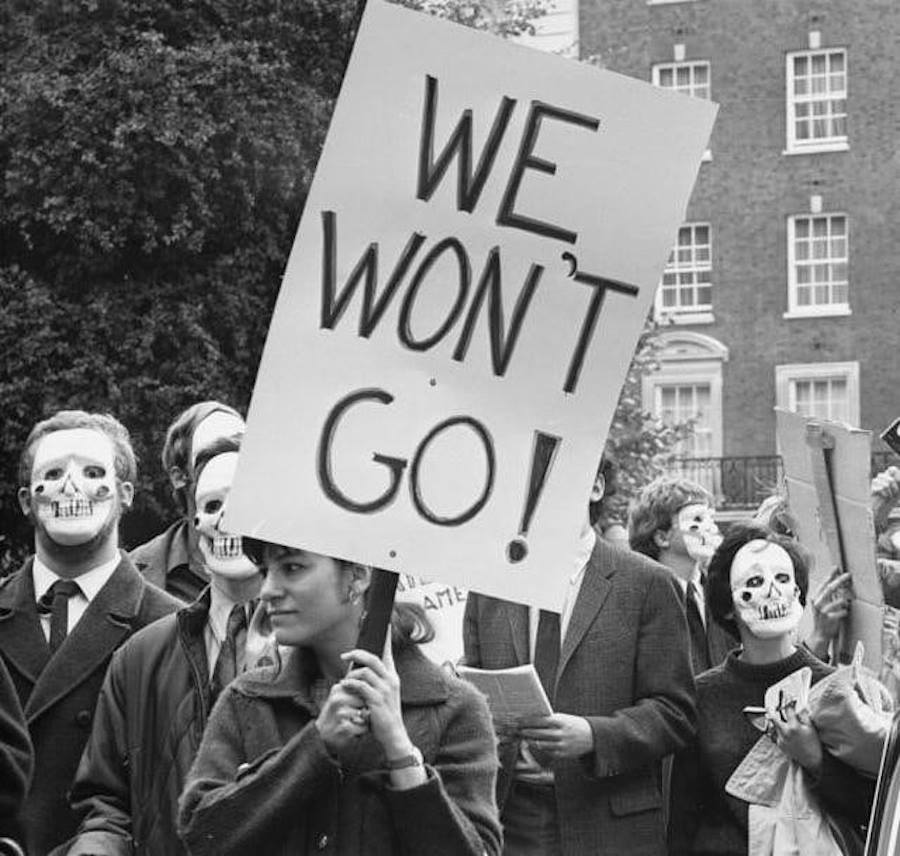
Life Lessons from our Parents
Memoir Prompts Questions for Mom & Dad
Ann, Sting Ray Summer, Ch21: Landmines on the Road to Silverton, Fall 1964, Spring 1965, Glendale, Arizona
At what point do we stop learning from our parents? Depending on how closely we paid attention as children, maybe never. Maybe those lessons echo through the decades to guide and shape us for life. Or maybe it’s in our DNA? A dear friend from high school mentioned the other day he wished he had asked my dad and my brother more questions, all those years ago.
Really? He believes he had something to learn from my parents and brother?
Funny thing: Having recently finished a joint memoir with Terry about the angst we endured as we decided to get married, I’ve thought about my parents a lot in the process, and not just about that rocky time before I got married. For one thing, I wonder what they would think about our leaders today? Would we be closer in our opinions than we were half a century ago?
What new do I have to learn from my parents? But more specifically to our past lives, I wish I had asked my dad and my mom lots of questions – like how did you meet, and why did you elope – just for starters. Surprisingly, I never asked whether there was more to that story. I wish I had! Too late curious.
I would also ask, What do you see as your greatest accomplishments? Plus, what were your toughest life choices and why . . . and in retrospect, how do you feel about the decisions you made? What would you do differently — if only. . .?
Are You Still Learning from Your Parents?
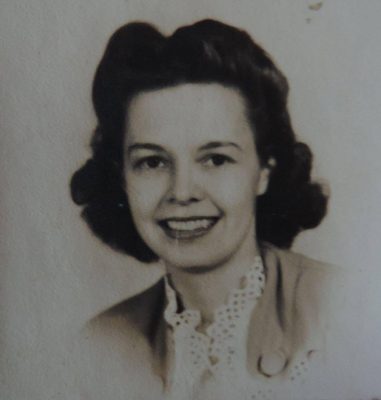
Mom, in her mid-20s
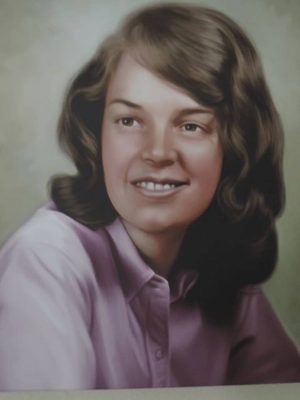
Ann, at 21
Have you ever wished you knew more about another family member – too late? If so, who, and what? By the way, we’ve tentatively named our memoir Sting Ray Summer.” It’s centered in the summer and fall of 1964 when I finally made a life choice my parents didn’t approve. Whew! It was a tough year – but I never considered eloping!
You don’t have to write a memoir to want to know more about your family history, however. And if you do want to know more, ask NOW, before it’s too late!
Where Were You When JFK Was Assassinated?
November 22, 1963: A Date Burned into Memory
Ann, Sting Ray Summer, Ch 9, Driving into the Past, November 22, 1963, Dallas Texas, and Boulder, Colorado
Like an old photo preserved in a durable album, memories of the day President Kennedy was assassinated are as vivid now as they were half a century ago. Here’s my recollection:
“I was at work in my college dormitory when I heard two girls crying. Letters from boyfriends sometimes brought tears, but this was different. I peeked out of the mailroom. ‘What’s wrong?’ I said.
“’The President’s been shot!’ one of them wailed.
“’Pr- President Kennedy?’ I stuttered.
“’I don’t want to die!’ the other one bawled.”
JFK Assassinated?! Not Possible!
“I locked the mailroom. Called my friend Terry. We wandered through the campus benumbed. Our Camelot president was gone. Who could have done it? Why?
“A bunch of us migrated to the home of our favorite prof. Glued to the TV, we spent the three-day weekend in his cramped front room sharing tears and cold pizza.”
I can still hear the drum cadence of the funeral procession, see the white stallions, Jackie Kennedy and the two children, 50-plus later.
What are your recollections – or impressions – of the day JFK was assassinated?
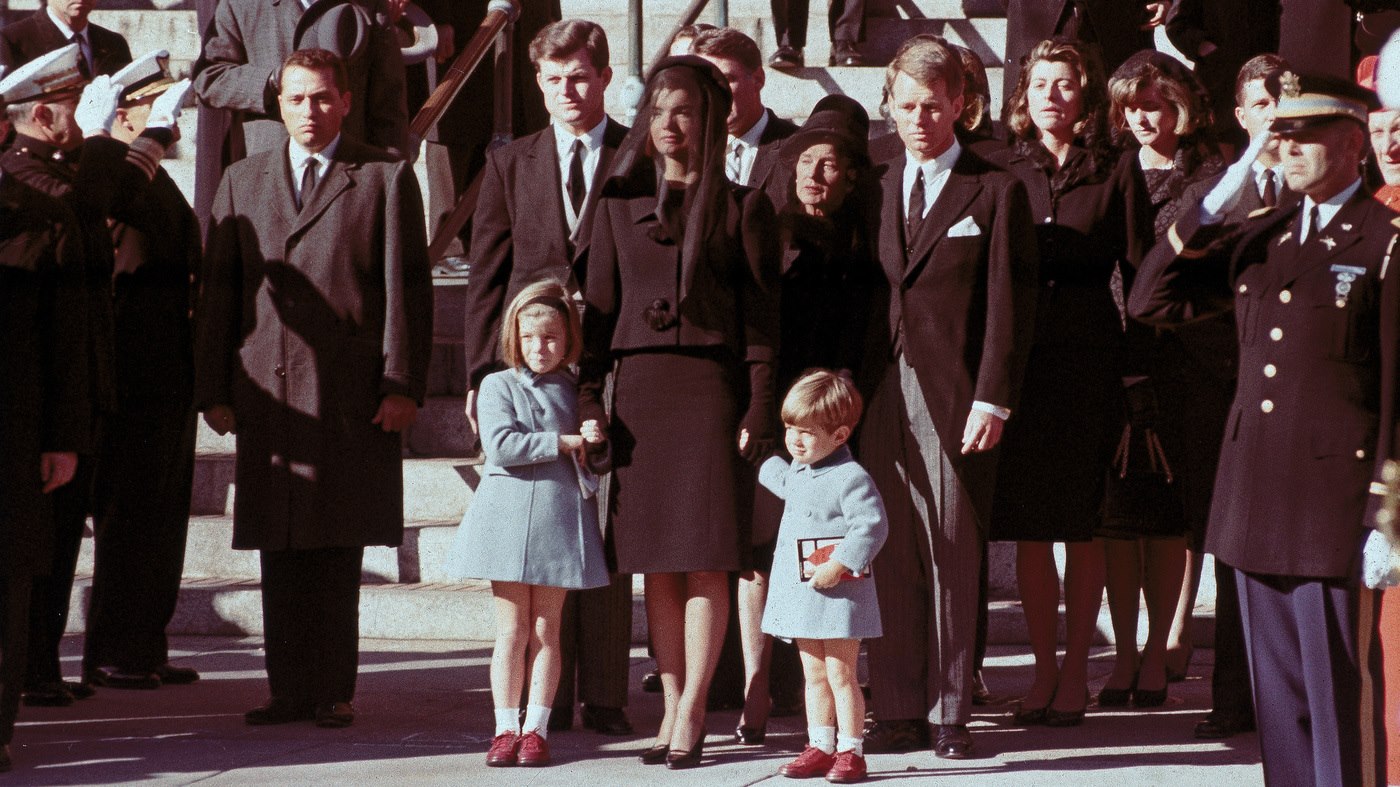

Sign Up for News Flashes
Please keep in touch! And to be notified for events around A Rendezvous to Remember and other news from us, please sign up. Our promise? We won’t sell your address to anyone or clutter up your inbox with junk.




